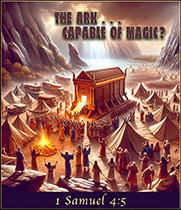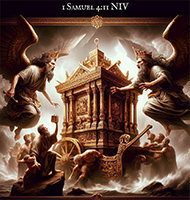1 Samuel 4:1–22 . . . Bible Study Summary with Videos and Questions
“Israel’s Defeat: The Ark of the Covenant Is Captured”
Israel went out to battle against the Philistines: During this time, there wasn't a great world power (e.g., Egypt or Assyria) seeking to dominate the region. So, Israel's battles were waged against her nearby neighbors: the Moabites, the Ammonites, or the Philistines. Israel was able to compete with Moab and Ammon, but the Philistines benefited greatly by having a Greek influence. Its military equipment (e.g., helmets, shields, swords and spears) fashioned around Greek designs made the Philistines formidable opponents. They were the first people in Canaan to process iron, and they made the most of it.
The Israelites had been dominated by the Philistines for a long period of time such that the Philistines looked upon them as their slaves (v. 9). For some undisclosed reason, battle broke out between the Philistines and the Israelites; the Israelites were beaten badly. When the dust settled, 4,000 Israelites had died (v. 2). And when they returned to camp, they couldn't understand how God would have allowed them to suffer such a defeat. In today's twenty-two verses, we'll come to the tragic end of an era in Israel’s distant past — Eli’s 40-year service as judge and priest) — try to reflect on the lessons that this text has for us as Christians today.
Leaders of Israel Send for the Ark (4:1–4)
[Note: Click the link to This Week's Passage near the bottom of this page to read today's Scripture.] The Philistines were people from Philistia, a nation on the south-west border of Israel. Although it was a small nation, its army became very powerful. We'll learn that it was Israel’s most threatening enemy during the lives of Samson, Samuel, Saul, and David. During that period of history, both nations fought each other often. Our passage describes a typical battle during that time. Men from each nation gathered in camps, not far from the other, waiting to see which side would begin the battle.
On this particular occasion, the Philistines began the fight and were successful; 4,000 of Israel’s men died in the battle. Soldiers returning to Israel’s camp were worried. They suspected that they'd be unable to defend themselves in the next battle. Israel’s people weren't loyal to the real God; as a result, its leaders blamed him for the defeat. They likely felt: God hasn't supported us in the battle. Instead, he's helped our enemies.
Without fasting and prayer, without consulting God, the Israelites decided to practice superstition. Sadly, the ark of the covenant wasn't viewed as a symbol of God’s presence; it was seen as a magic lamp that they needed to rub rightly to summon God to their aid. The Ark became the Israelite's good-luck charm. With it, they suspected that, wherever they'd take it, they'd be blessed. Of course, they reasoned, we didn’t take the Ark with us into battle so we lost! Therefore, we’ll take it with us when we go to battle tomorrow when we'll certainly win. God will surely be with us and bless us when he sees that his Ark is with us.
From Joy to Disaster (vv. 5–11)
5When the ark of the Lord’s covenant came into the camp, all Israel raised such a great shout that the ground shook. 6Hearing the uproar, the Philistines asked, “What’s all this shouting in the Hebrew camp?” (1 Sam. 4:5–6)
The plan backfired miserably. It was a huge disaster from the perspective of those who thought the ark would assure their victory. When the ark was brought out of its tent and into the Israelite soldiers' camp, a great shout resounded from the Israelites. It became something of a huge pep rally with the Israelite warriors getting really pumped (v. 5). They couldn't lose, they thought, since God would then be with them. However, their echoes of joy reached all the way to the Philistine camp where its soldiers become afraid (v. 7).
The Philistine soldiers heard the uproar that came from the Israelite camp; they wondered what could have caused such a triumphant shout? They learned that the Israelite's ark had been brought into camp. Like the Israelites, they looked upon the ark as though it was capable of magic. They recalled that, when God led the Israelites against the Egyptians, they were defeated. They remembered the stories of the victories God gave the Israelites over their enemies (v. 8), and that whenever the Israelites fought their enemies, they'd taken the ark with them. They now feared that the presence of the ark before the Israelite armies assured Israel of a victory. We might die, the Philistines concluded, but at least we can die like men (v. 9).
Rather than give up, the Philistines become motivated to fight to their death and to die like heroes. This realization resulted in the Philistines being even more motivated to fight than the Israelites were, allowing the Philistines, once again, to defeat the Israelites who foolishly concluded that by taking the ark of God to war, success in battle would be guaranteed. However, this time 30,000 Israelites were slain. Among the dead were Hophni and Phinehas (v. 11), the two priests who served at the tabernacle in Shiloh; they were Chief Priest Eli's sons, both slain when the ark of God was captured by the Philistines as a war trophy. As God had previously warned Eli (2:34), both of his sons died the same day.
Their deaths were a fulfillment of a prophecy from God, who had judged Eli and his household due to the wickedness of his sons and Eli's failure to restrain them. Hophni and Phinehas were known for their corrupt behavior, including abusing their priestly duties and engaging in immoral acts. They were killed in battle against the Philistines, during which the Ark of the Covenant was also captured.
Israel’s Torment at the Loss of Its Ark (vv. 12–18)
A man of Benjamin made a hearty run from the battle line the same day, running to Shiloh (v. 12): The battle was fought near Aphek (v. 1), which was at least twenty miles from Shiloh. The messenger had a long way to run; the route was mostly up hill, bringing with him very bad news. Upon arriving, he spoke first to townspeople; then Eli called him. There at Shiloh, perhaps nobody waited more anxiously for news of Israel’s battle than Eli. As chief priest, he probably knew his responsibilities well: he couldn't attend funerals or go near a dead body. Even when his parents died, he couldn't join in the sad ceremonies (Leviticus 21:10–12).
Eli was stationed by the road, sitting in his seat, trembling as he eagerly awaited news of the battle. He was rightly more concerned about the fate of the ark of God than the fate of his sons. He knew that he'd let the ark go on an unwise, superstitious errand; his conscience made him fear disaster. As he heard the commotion in the city regarding the battle loss, the priests, and the ark, he asked for information. The messenger told him an account that went from bad to worse: The ark was gone from Shiloh, as were his two sons. The approaching Benjamite soldier who'd escaped death raced from the battle scene, back to Shiloh, with his clothes torn and dust on his head, which was a sign of mourning and defeat. Eli wasn't able to see that because he was nearly blind at ninety-eight. The rest of the city began to cry and wail aloud as word of their defeat quickly circulated (v. 13).
Although Eli couldn't see much of anything, he could hear; what he heard frightened him. His ears, as it were, were about to tingle (see 3:11). He asked what the noisy commotion meant and the escapee messenger hastened to his side where he briefly summed up his dire report (v. 17). The news about the ark of the covenant was devastating to Eli. The ark had been or should always have been the most sacred object in Israel; it was the sacred box that documented evidence of God’s covenant (agreement) with Israel; Eli and his family had guarded that box for 400 years. As chief priest, he considered nothing to be more precious or as important as that box. He couldn't accept the news of its loss; Israel had lost the one object that was a testimony to its relationship with God. Because of the shock of this news, Eli tipped backwards off his seat by the side of the city gate, fell backward, broke his neck, and died (v. 18). He'd led Israel for 40 years.
The context of his death is that a messenger had just delivered devastating news: (1) Israel had been defeated by the Philistines in battle; (2) there was a great slaughter among the people; (3) his two sons, Hophni and Phinehas, had been killed; (4) the Ark of God had been captured by the Philistines. It was the news of the Ark's capture that caused Eli to fall.
Additional Tragedy in Eli’s Family (vv. 19–22)
19His daughter-in-law, the wife of Phinehas, was pregnant and near the time of delivery. When she heard the news that the ark of God had been captured and that her father-in-law and her husband were dead, she went into labor and gave birth, but was overcome by her labor pains. 20As she was dying, the women attending her said, “Don’t despair; you have given birth to a son.” But she did not respond or pay any attention.
21She named the boy Ichabod, saying, “The Glory has departed from Israel”—because of the capture of the ark of God and the deaths of her father-in-law and her husband. 22She said, “The Glory has departed from Israel, for the ark of God has been captured” (1 Sam. 4:19–22).
Sadly, the house of Eli wasn't finished having endured Eli's and his sons' death. The wife of Eli’s son, Phinehas, was pregnant. While in labor, a problematic situation developed and she didn't pay attention to the women attempting to comfort her. She learned that her child was a boy. For a Jewish woman, news that a son had been born was wonderful news. But not for Phinehas's wife that day. She named him Ichabod, meaning “no glory,” because the ark of God had been captured; numerous soldiers had been slaughtered; and her husband, sons-in-law, and father-in-law had died — all on the same day! The anguish was so great that labor pains came upon her. Eli's daughter-in-law seemed more perceptive than husband Phinehas. She realized that the greatest disaster was the loss of the ark. In her mind, the ark's capture amounted to the departure of God’s glory.
How could God allow something so terrible to happen? First, he possibly allowed it as a righteous judgment upon the nation Israel and the family of Eli: Everyone received what they deserved. Secondly, God allowed it as a correction to the nation, so they wouldn't trust in "the ark of God" but, instead, trust in "the God of the ark."
Evil can cause goodness Today, the many circumstances that we regard as a calamity, God evidently uses in marvelous ways to glorify himself. That day, Israel was right to have been saddened by the loss of lives and the ark. But they should have remained confident, knowing very well that God was more than capable to take care of himself. "Thus, as God was no loser by this event, so the Philistines were no gainers by it; and Israel, all things considered, received more good than hurt by it, as we shall see." (Matthew Poole, 1624–1679).
† Summary of 1 Samuel 4:1–22
In this twenty-two-verse passage, Israel faces a devastating defeat by the Philistines at Ebenezer, losing 4,000 men in the first battle (4:1–2). Seeking victory, the elders bring the Ark of the Covenant from Shiloh, accompanied by Eli’s sons, Hophni and Phinehas, hoping its presence will guarantee God’s help (vv. 3–4). The Israelites shout triumphantly, but the Philistines, although frightened, rally themselves and attack again, resulting in a catastrophic loss for Israel — 30,000 foot soldiers killed, the Ark captured, and Hophni and Phinehas slain (vv. 5–11).
A messenger brings the tragic news to Eli, who is overwhelmed when he hears of the Ark’s capture and falls to his death (vv. 12–18). Phinehas’s wife, upon hearing the news, goes into labor, names her son Ichabod (“The glory has departed from Israel”), and dies, signifying the spiritual loss that accompanied the military disaster (vv. 19–22). This chapter underscores that Israel’s reliance on the Ark as a lucky charm was misplaced, and that God’s presence doesn’t rest in ritual or objects, but in faithful relationship and obedience.
Key points with verse references:
• Israel is twice defeated by the Philistines, suffering heavy casualties — first 4,000, then 30,000 are killed (vv. 1–2, 10).
• The Israelites bring the Ark of the Covenant from Shiloh, hoping for victory, but misuse it as a superstitious object (vv. 3–5).
• The Ark is captured by the Philistines; Eli’s sons, Hophni and Phinehas, die in the battle (vv. 10–11).
• On hearing the news, Eli dies; Phinehas’s wife gives birth to Ichabod, declaring, “The glory has departed from Israel” (vv. 12–22).
• The spiritual lesson is the danger of relying on religious symbols instead of true devotion and obedience to God (implied throughout, see especially vv. 3, 21–22).
This Week's Passage
1 Samuel 4:1–22
New International Version (NIV) [View it in a different version by clicking here; also listen to chapter 4 narrated by Max McLean.]
† Summary Video: “The First Book of Samuel”
† Watch this introductory video clip created by BibleProject on bibleproject.com.
- Q. 1 Why did the Israelites bring the Ark to the battlefront? Why was that wrong to do?
- Q. 2 When have you trusted in symbols or rituals instead of the reality to which they point?
- Q. 3 At the close of this story, what "good news" helps to offset some of the "bad news"?
- Q. 4 What low points and high points have marked your spiritual pilgrimage? Where are you just now on "the bad-news-to-good-news spectrum"?
- Q. 5 When was the last time you felt deserted by God? What was the cause? The solution?



